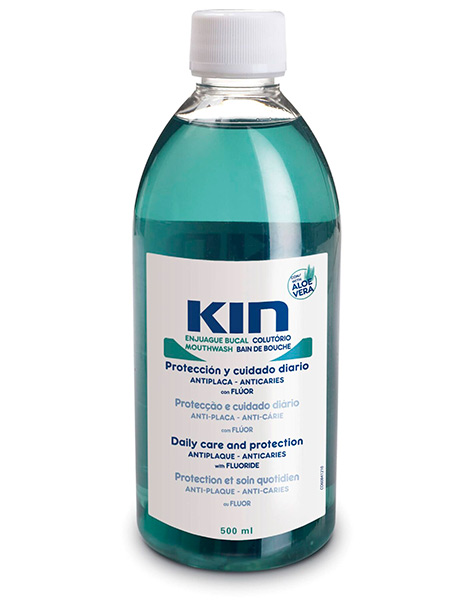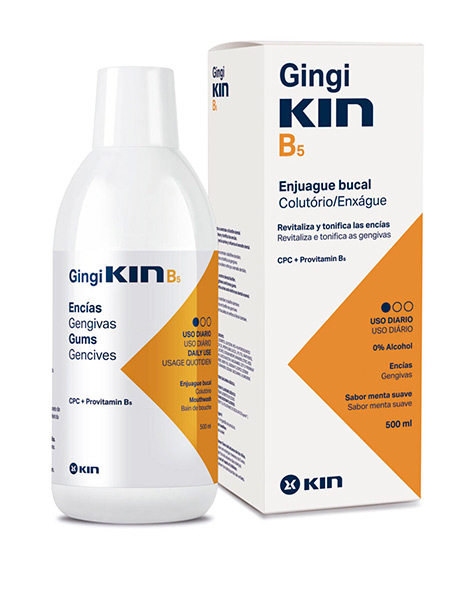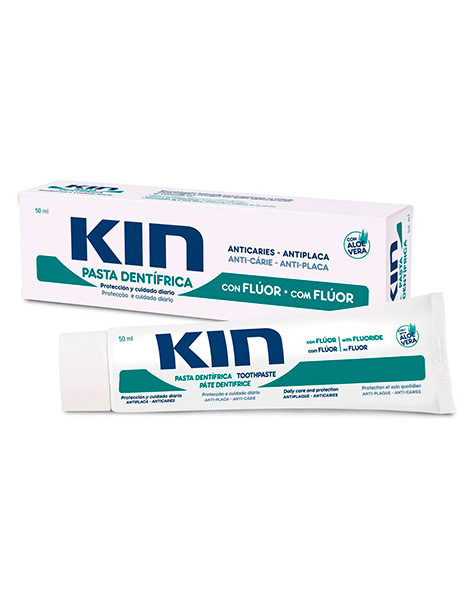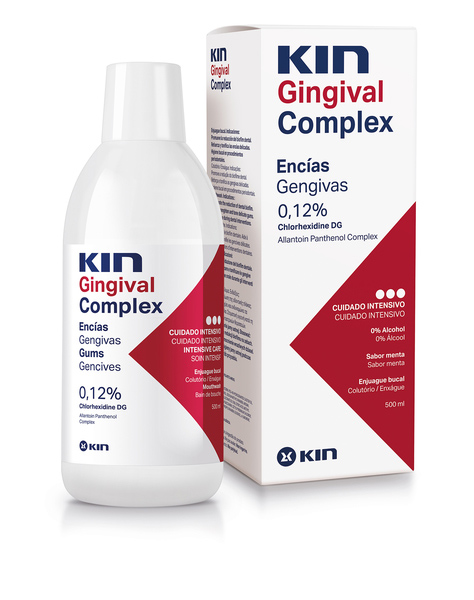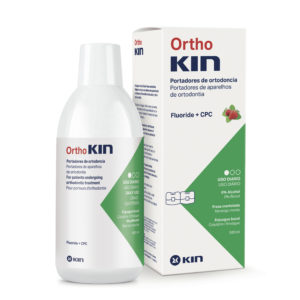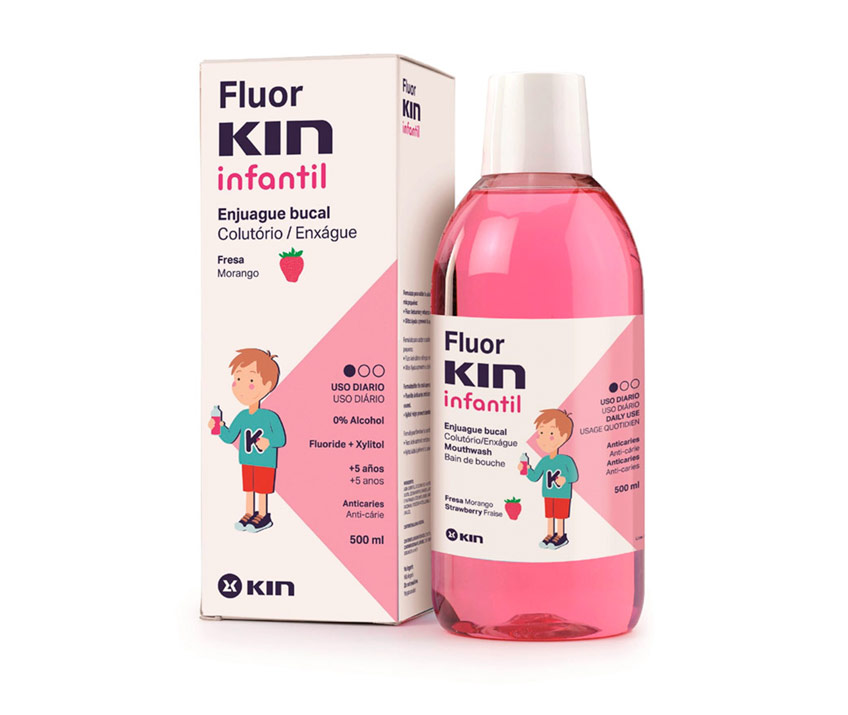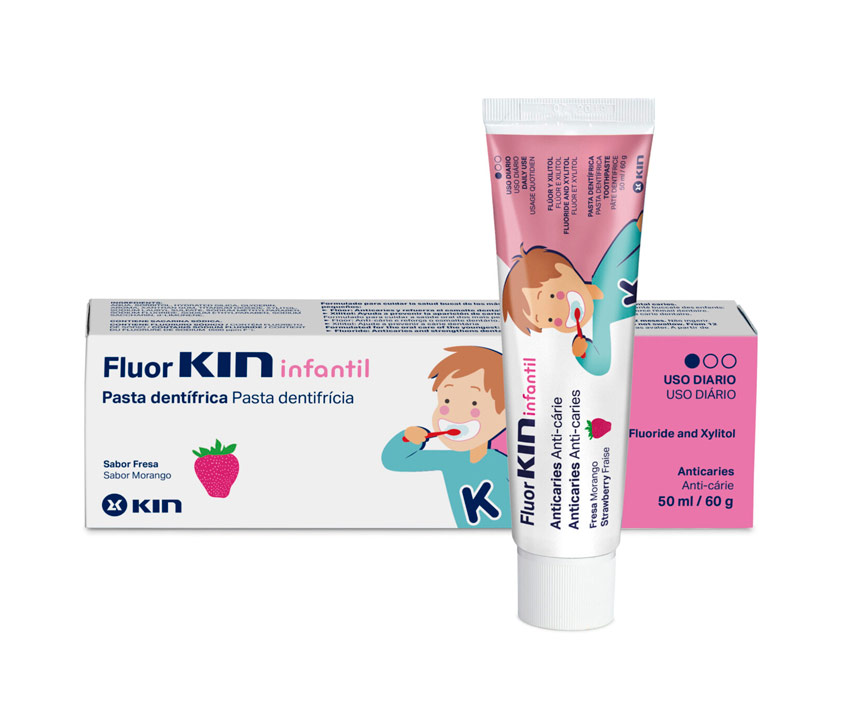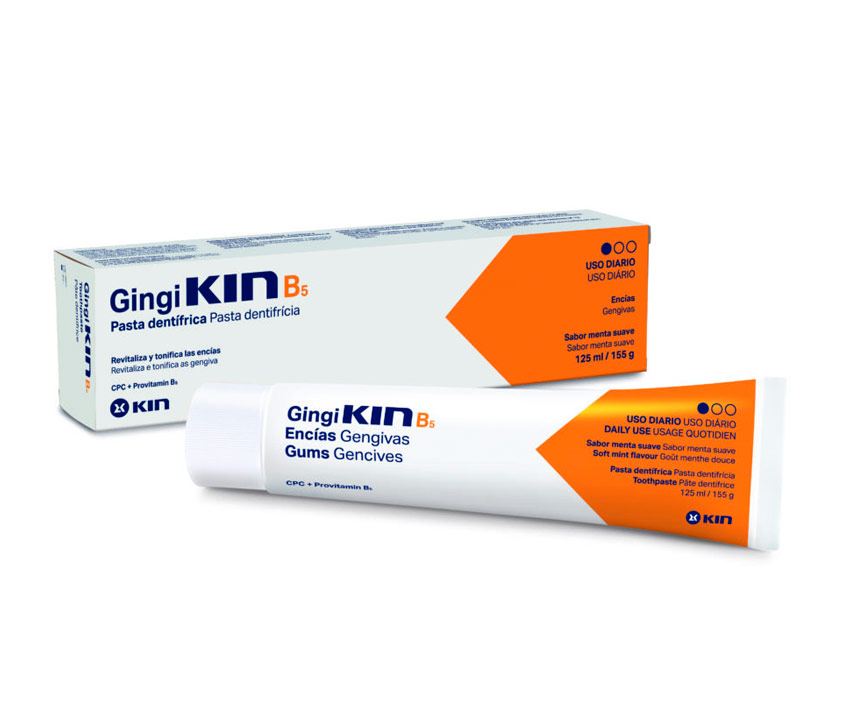Is there any relationship between COVID-19, mask use and oral health?
- 1 Is there any relationship between COVID-19, mask use and oral health?
- 1.1 Cetylpyridinium chloride oral hygiene products
- 1.1.1 KIN Mouthwash
- 1.1.2 KIN FRESH MOUTH SPRAY
- 1.1.3 GINGIKIN B5 / KIN B5 Mouthwash
- 1.1.4 KIN TOOTHPASTE
- 1.1.5 KIN GINGIVAL COMPLEX Mouthwash
- 1.1.6 ORTHOKIN Mouthwash
- 1.1.7 Mouthwashes and toothpastes with cetylpyridinium chloride
- 1.1.8 Oral hygiene products indicated for COVID-19 in adults
- 1.1.9 Oral hygiene products suitable for COVID-19 in children
- 1.2 How does coronavirus manifest itself in the mouth?
- 1.3 Bibliography
- 1.1 Cetylpyridinium chloride oral hygiene products
In the current race to find a vaccine against the new coronavirus, there are many lines of research open for the protection of the most vulnerable population. Recent findings have considered the reinforcement of oral hygiene measures as one of the most effective techniques to limit the risk of developing or transmitting the disease.
An in vitro study conducted by Chinese scientists shows the interaction of the SARS-CoV-2 virus with different receptors located on some of the cells in the human body. The use of the replication machinery of this type of cells by the coronavirus favours a rapid infection. Most of the cells with these receptors are found in the epithelium of the tongue and the oral mucosa, the main route of entry of the virus into the body.
At the same time scientifically proven rapid replication of the virus in the tissues of the upper airways during the first 7 days of infection.
Thanks to these findings, oral hygiene comes to the fore in protection against the virus. One of the most effective products for strict and effective oral hygiene is cetylpyridinium chloride, present in toothpastes and mouthwashes to reduce the microbial load in the mouth, effectively and without side effects.
Cetylpyridinium chloride products for oral hygiene
Cetylpyridinium chloride (CPC) is a compound derived from quaternary ammonium that has been used for years in mouthwashes and oral hygiene products as a prophylactic tool against different microorganisms. It is commonly found in specific treatments for the upper respiratory tract, with high effectiveness against bacteria and viruses that are commonly found in the mouth and throat.
This chemical is used to control the microbial load, acting as a powerful antiseptic. It prevents the formation of dental plaque, the appearance of cavities, gum infection, and other oral problems related to different microorganisms such as halitosis.
Due to its effectiveness against other types of viruses, several studies have been carried out to test its effect on the prevention of COVID-19. In vitro research has demonstrated its action against virus replication by interfering with cell receptors in the respiratory tract.
Use a Mouthwash or toothpaste with cetylpyridinium chloride protects against coronavirusThe company has also developed a new product, which has been designed to improve oral hygiene in conjunction with other health measures to control the spread of the disease.
Cetylpyridinium chloride mouthwashes and toothpastes
Along with daily use of toothbrush and toothpaste, mouthwashes play a very important role in the oral hygiene routine. They manage to reach the areas less accessible to the toothbrush, providing other compounds that complement the protection of teeth and gums.
Cetylpyridinium chloride and chlorhexidine are the two most commonly used antiseptics in dentistry for the treatment of periodontal diseases. Specifically, CPC is a broad-spectrum antiseptic, effective against bacteria, viruses and fungi.
Within KIN's oral hygiene products, there is a wide range of toothpastes and mouthwashes that include CPC in their composition. With a concentration of Cetylpyridinium Chloride of 0.05%, they are highly effective in lowering viral load in the mouth and throat.
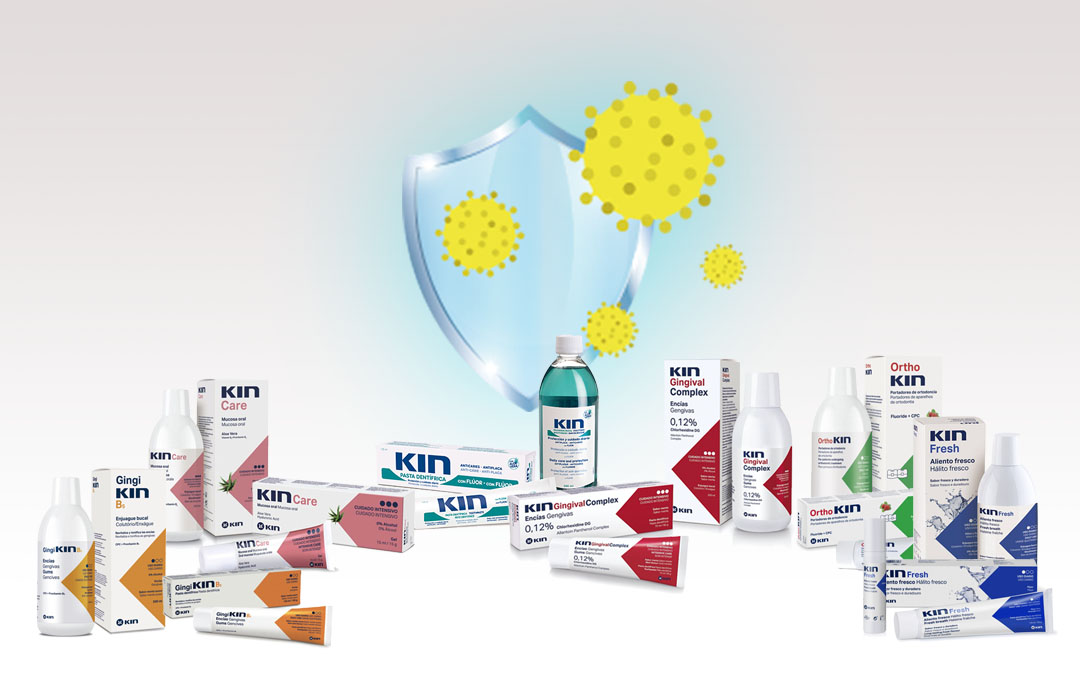
Oral hygiene products suitable for COVID-19 in adults
Aimed at an adult audience, there are different ranges of KIN products to suit the needs of each patient. For daily care within the family environment, the KIN toothpaste and the Mouthwash KIN with aloe vera, fluoride, provitamin B5 and cetylpyridine chloride in a concentration of 0.05% allows a more complete and effective oral hygiene.
For more complete care of the gums, the toothpaste GINGIKIN B5 and the Mouthwash GINGIKIN B5 protects against gingival pathology by preventing the accumulation of biofilm on teeth and gums. In addition to cetylpyridine chloride 0.05%, it contains zinc citrate, provitamin B5, fluoride and xylitol for daily use.
With chlorhexidine digluconate, Alpantha and 0.05% cetylpyridine chloride in the toothpaste KIN Gingival Complex and the Mouthwash KIN Gingival Complex are expressly indicated for gum problems, reinforcing oral hygiene in periodontal procedures.
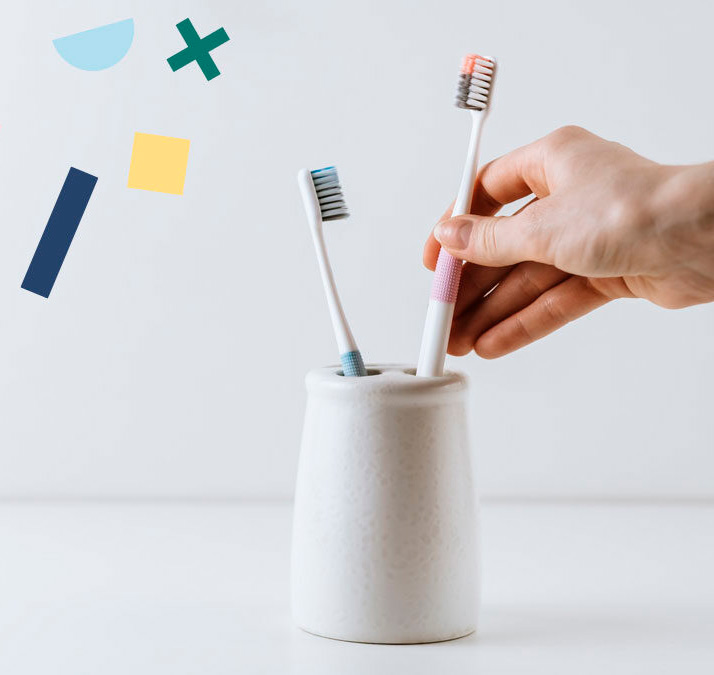
Oral hygiene products suitable for COVID-19 in children
For the protection of the youngest in the house, it is necessary to control the use of certain compounds during their oral hygiene. The GINGIKIN B5 rangeBoth the toothpaste and the Mouthwash with cetylpyridinium chloride is suitable for children from the age of 12, taking care of the health of their teeth and gums, and protecting against the coronavirus.
COVID-19 is a new disease that is still under study. Associated symptoms in infected patients include acute respiratory syndrome, fever and gastrointestinal symptoms.
Gradually, a characteristic clinical picture has developed, with symptoms suffered by most of those infected. Among them, loss of taste and smell are the most frequent, although there are those who relate studies who relate COVID-19 with other oral problems such as sores and ulcers, gingivitis, dry mouth, and even bad breath.
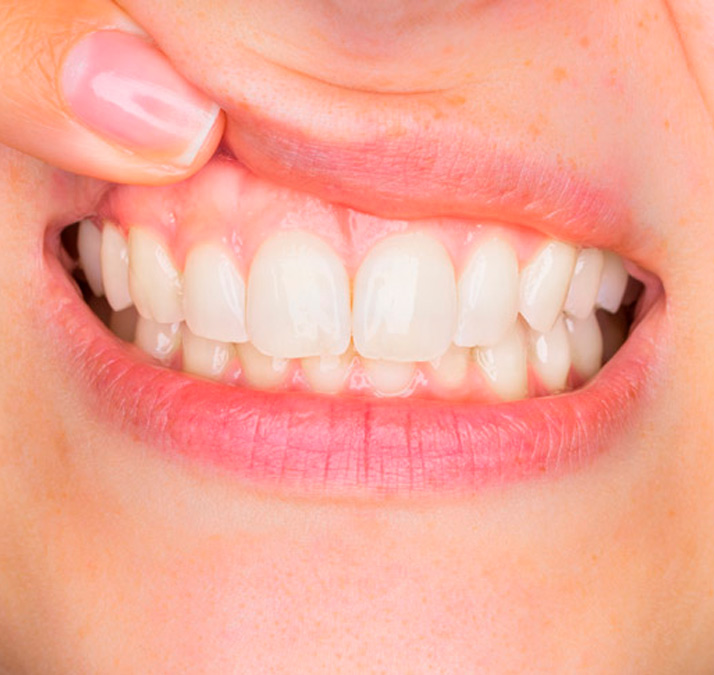
Among the range of sequelae that patients may suffer once they overcome coronavirus disease, there are some oral damages that are beginning to be described as frequent. Many of these derive from loss of taste and decreased saliva production, affecting the integrity of the tooth enamel, as well as the gums themselves.
Although long-term studies are still needed, after patients have healed, different intraoral lesions have been found that could be caused by SARS-CoV-2 infection.
Small bruises on the oral mucosa, gingivitis and periodontitis are some of the most prominent. Whether they are caused by stress or by the activity of the virus itself, they are symptoms that are repeated in more and more patients who have had the disease.
Dry mouth
It should be noted that dry mouth or xerostomia is a symptom that frequently accompanies the loss of taste caused by COVID-19. This could be due to the presence of the virus in the salivary glands, using the replication machinery of this cellular tissue for its own benefit.
It is not yet known whether this alteration could persist over time, as it needs to be investigated in depth whether the reduced saliva production is due to the inflammatory process itself, or to some kind of neurological alteration caused by the virus.
In mild cases, the KIN Hidrat line products are a great help in combating dry mouth or xerostomy problems. Starting with KIN Hidrat toothpaste, KIN Hidrat moisturizing gel to hydrate the mucosa, to KIN Hidrat oral spray to refresh the mouth in patients with more pronounced symptoms.
However, this alteration in saliva production is undoubtedly much more pronounced in patients who have required mechanical ventilation and in the more serious cases of hospitalization for coronavirus. In these cases, after the passage of the disease, KIN Hidrat products are very useful for patients who are still recovering from the remaining oral symptoms.
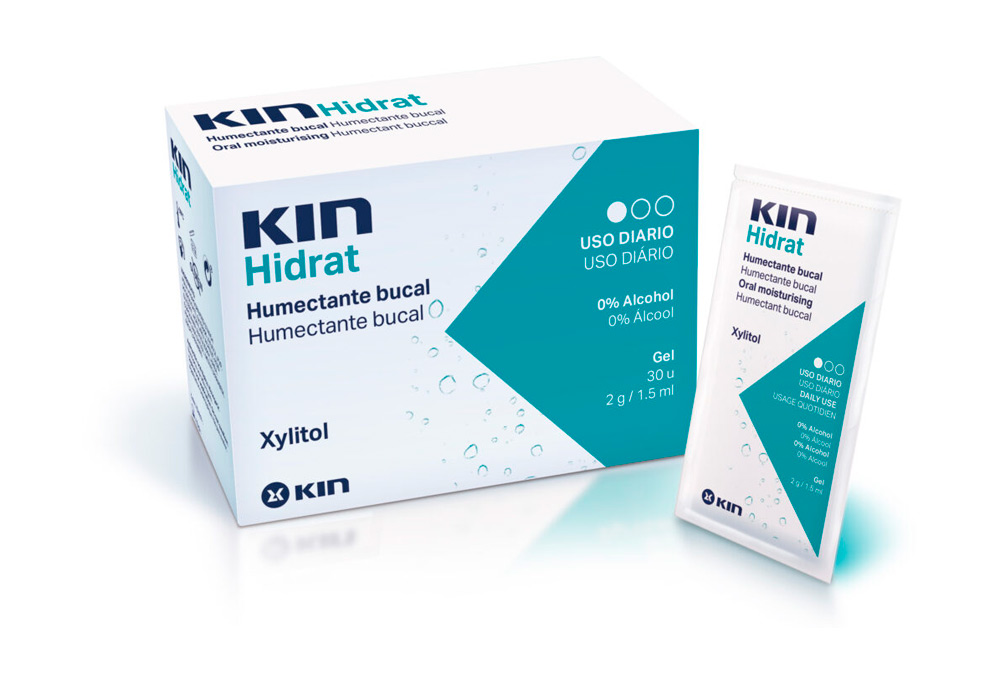
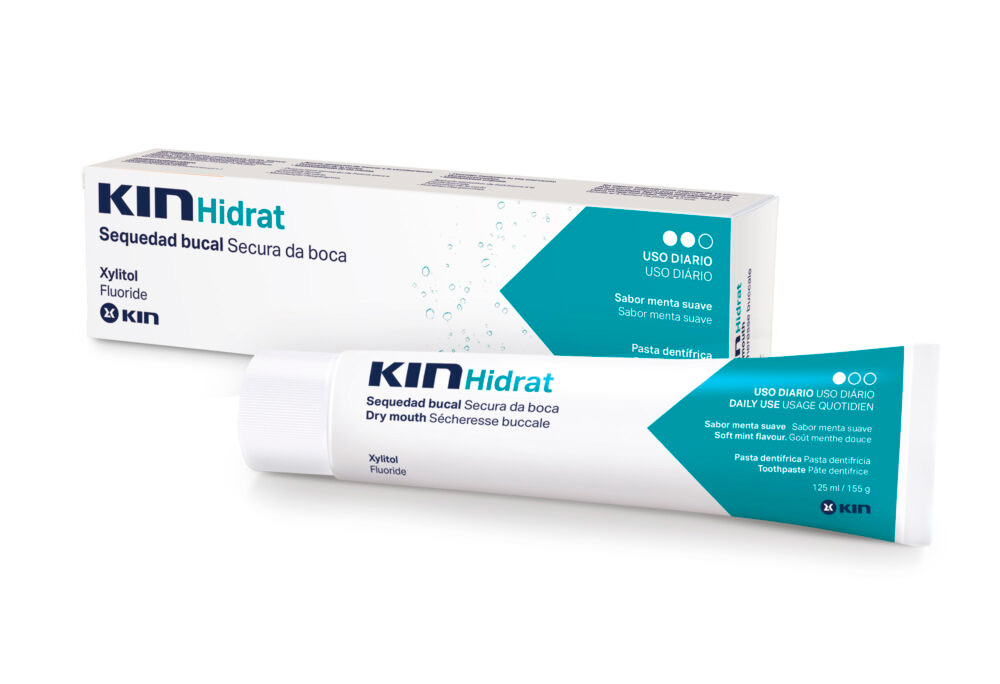
Caries appearance due to stress and xerostomia
Although caries is not considered a symptom caused directly by the action of the coronavirus in the patient, the General Council of Dentists of Spain has issued through a statement the importance of maintaining oral health at the time of COVID-19 addressed to the entire population.
Among these recommendations, he stresses to patients after COVID-19 the importance of having a check-up at the dentist to assess the state of oral health.
Due to stress and dry mouth, the incidence of caries has increased considerably. This problem could be due not only to the action of the virus, but also to neglect of hygiene by the patient, in addition to a series of elements that are part of the 'new normal' and that could negatively affect the health of teeth and gums.
Halitosis due to the use of the mask
Another common symptom of the 'new normal' is mask-related halitosis. While this problem of bad breath may be caused by a lack of oral hygiene, overuse of the mask itself makes the situation worse.
Spending too many hours with the mask on may promote an anaerobic environment inside the mouth, where oral bacteria develop more rapidly. For this reason, it is necessary to take extreme care with hygiene, paying special attention to the formation of bacterial plaque and the accumulation of food debris.
The KIN Fresh line has special products for controlling bad breath, including the KIN Fresh toothpaste, the Mouthwash KIN Fresh, and its KIN Fresh mouth spray to always be on hand when you are out and about with your mask.
However, if the halitosis problem was already present before the use of the mask, it could become more noticeable. The first step is to detect the cause to fight the bad breath from the root.
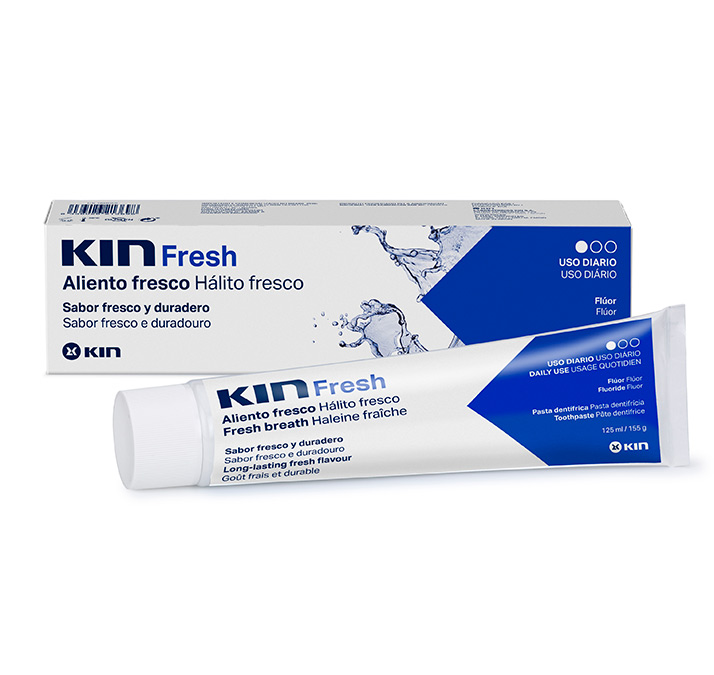
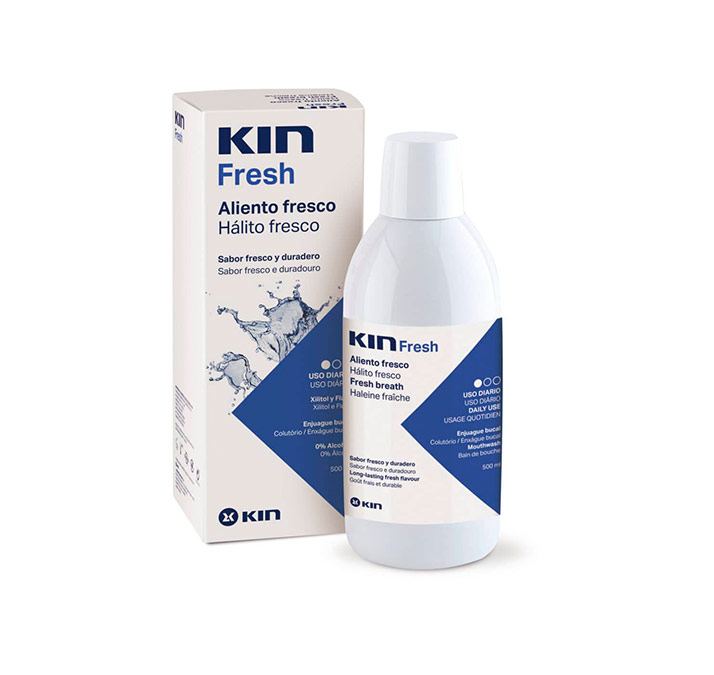
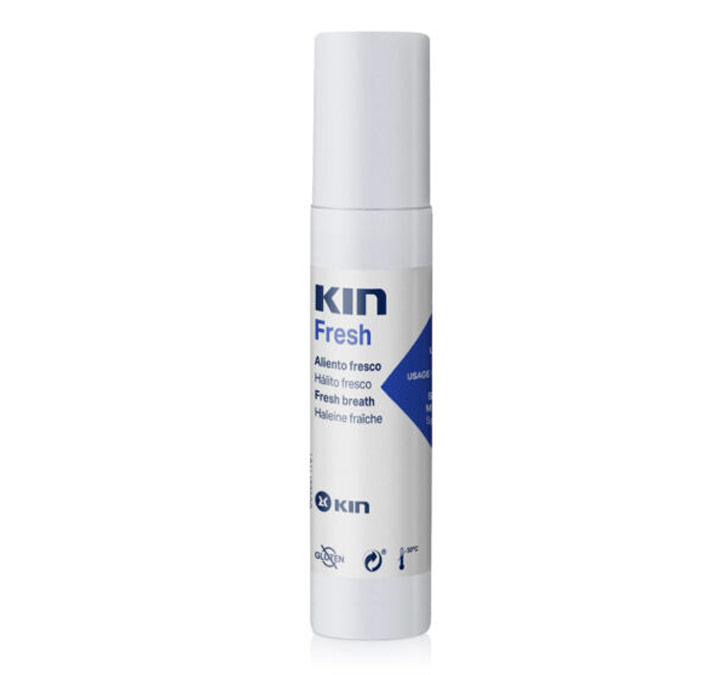

Among the oral hygiene recommendations issued by different official bodies such as the Professional Association of Dental Hygienists of Madrid, one of the most important measures is the use of mouthwashes with cetylpyridinium chloride in a concentration of 0.05% to prevent infection or reduce viral load in the mouth and upper respiratory tract.
- Cetylpyridinium chloride as a tool against COVID-19 -
This chemical contained in the different KIN oral hygiene products provides 3 to 5 hours protection, controlling the oral microbial load.
They are especially useful in patients who are going through an active process of COVID-19, limiting infection and transmission of the virus. Simply gargle and rinse about 3 times a day with a daily use product, while preventing other related problems such as bad breath, dry mouth and gingivitis or mouth ulcers, just by choosing the most appropriate KIN treatment line for each patient.
Along with the recommendation of the use of CPC mouthwashes, there are other measures to limit the spread and transmission in the home, which are very easy to carry out and highly effective.
Gradually, more and more measures are being discovered for the control of coronavirus and the relief of symptoms manifested by patients who pass the disease. The preventive effect of cetylpyridinium chloride against the development of the virus in the respiratory tract has been demonstrated, and by maximising oral hygiene measures, it is possible to control the spread of the virus through measures that are within everyone's reach.
Bibliography
- High expression of ACE2 receptor of 2019-nCoV on the epithelial cells of oral mucosa
- Virological assessment of hospitalized patients with COVID-2019
- Cetylpyridinium Chloride (CPC) Exhibits Potent, Rapid Activity Against Influenza Viruses in vitro and in vivo
- Oral Manifestations of Infection COVID-19
- Oral vesiculobullous lesions associated with SARS-CoV-2 infection
- Oral health is essential in times of COVID-19
- COVID-19: Oral Hygiene Recommendations

